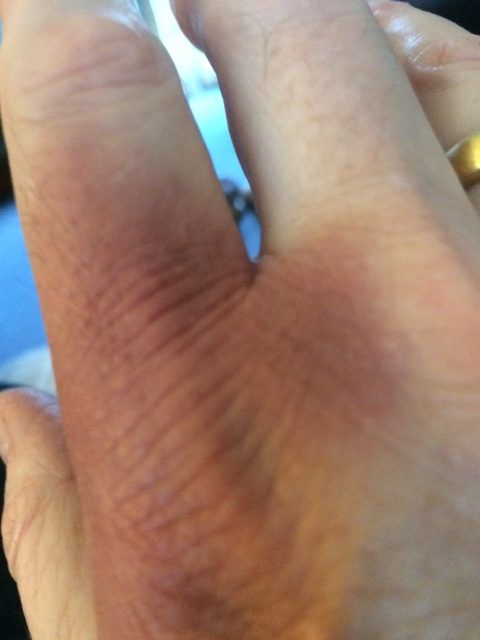The story of Anthony
After over 13 years of living with my ITP I can reflect upon plenty of incidents during that time. It has certainly been eventful, to say the least.
It all started in 2005 when I began getting random purple bruises (mainly on my arms, legs and torso). These bruises would appear without any warning or provocation and often overnight I would develop them mysteriously.
I was also suffering from acute fatigue, a tiredness that only those who have suffered from ITP or a number of other auto immune illnesses can describe. It was beyond exhaustion. The combination of random brusies and chronic tiredness, eventually led me to report to my doctor for a check up in July 2006.
Following that meeting with my doctor, a fretful dash to my local accident and emergency unit and many blood tests later, it was discovered that my platelet count was a measly 4000 when the normal platelet count should be between 150000 and 400000. I was seriously ill. It took about 8 hours to diagnose my ITP, an illness that only about 5000 people suffer from in the UK at any one time. It is most definitely rare !
Anyway, since then I have been on something of an ITP roller coaster, having many different treatments and suffering many wretched side effects whilst having some successes and many failures.
It hasn’t been a picnic by any means. I have been through the Prednisolone ringer five times, Rituximab twice and a horrible week or so with Azathioprine (I could not tolerate it all and withdrew from it within ten days).
I am one of those ITP sufferers who have been fortunate to respond well to Prednisolone and Rituximab. With the steroid, I have obtained about 6 months remission every time that I went on it and with Rituximab, I got about 2 years and 8 months remission both times that I had it, in 2010 and 2013. But in February 2016, I relapsed from the Rituximab remission.
So, at that point my specialist suggested that we try Mycophenolate Mofetil (MMF). He was reluctant for me to undergo a third round of Rituximab treatment. Although I had responded well to it twice already (2010 & 2013). He felt that the long-term damage that it could potentially do to my immune system was not worth the risk. More long stints with Prednisolone were also ruled out. Although I responded well to it, the problems that it caused every time that I had used it on 5 occasions already, would just not be bearable again.
For those not familiar with it, MMF like Prednisolone, Rituximab and Azathioprine is another immune suppressing drug which raises the platelet count by slowing down the destruction of platelets. It hopefully achieves this by suppressing the immune system and its’ penchant for incorrectly attacking and destroying our platelets. It has the added benefit in most cases, of fewer nasty side effects.
Since February 2016 MMF has been my constant companion. My platelets have settled at normal levels and even reached the low 200000’s , quite regularly. I could not be more delighted. The only side effects I get from MMF are a little nausea, usually first thing in the morning, but it is not too problematic. I don’t encounter any other issues at all.
Some ITP sufferers have had equally positive responses from MMF but as ever all I can say is that like all treatments, responses vary. I continue to have excellent platelet numbers, but I also keep a watchful eye out for any unprovoked bruises and am always wary about any signs of over tiredness. You have to keep a secret service like watch out for any ITP warning signs. That is the daily routine of any ITP sufferer, so nothing new there.
There is no cure for ITP, although there are numerous treatment options which can maintain a safe platelet level for the patient. Sadly they don’t always work for some people and many ITP sufferers take many years to find the treatment that works for them, some never find anything and learn to live with low platelet counts.
Once you have got ITP you always have ITP, it may be in remission but it can relapse at any time. There is never any room for complacency and I take nothing for granted.
One very important thing to mention about MMF, is that like all immune suppressing drugs it does reduce our ability to fight off infections, viruses, bugs, colds, flu’s etc. So, we are more vulnerable to illness than we otherwise might be. Like any treatment, it is a matter of measuring risk versus reward in all these things. We have to weigh up the side effects, potential problems (both short and long term) against keeping our platelet levels as high as possible and at consistent levels.
A further thing to keep in mind about MMF is that it makes us more vulnerable to skin cancer and therefore I must always wear a hat in the sun and always use Factor 50 sunscreen lotion.
After over 13 years of living with ITP, I can definitely confirm that MMF is the drug that best suits me. I am grateful and realise how fortunate that I am to have found a drug which maintains my platelets at normal levels, without any nasty side effects. I fully understand how tricky getting the right drug for each individual ITP sufferer can be. I went through 10 years of some pretty nasty times, but I am thankful to have come through them.
For those who wish to read my whole ITP story, please do check out my ITP blog at http://myownpurplepatch.simplesite.com
Further information about ITP can be obtained from https://www.itpsupport.org.uk/index.php/en/
